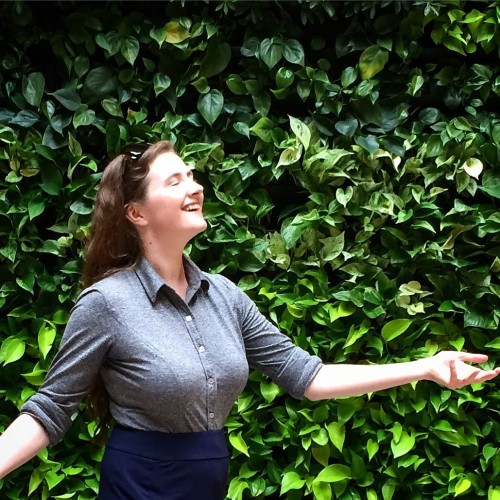
In May 2017, Allie Frownfelter launched Bottle Thread, a sustainability company in Pittsburgh that designs and sells clothing made from recycled plastic. She loves Pittsburgh and wants to give back to a city that is solving its own environmental problems. Inspired by her own mother’s kitchen and bath remodeling company while leaving
in Reading, Penn., she saw first-hand what it meant to provide a high quality service to customers.
“When I was ten my mom renovated a house and sold it for a profit,” says Frownfelter. “My brothers and I would be alongside her helping lay tile, replace cabinets, and update the electric. Learning all that at such a young age let me know that creating a business wasn’t as scary as it needed to be.”
Frownfelter would eventually go to college and settled into Chatham University as a sustainability major. In her last year, she created a business plan for Bottle Thread and researched ways to raise capital. She graduated in 2017 and set out to make a difference in a world overrun with plastic waste.
“I found a problem, I wanted a solution for it, and the company came from there,” says Frownfelter. “I’m just one of the first to make an essential point of using sustainable materials.”
According to a recent National Geographic report, the world amassed 6.3 million metric tons of plastic waste and only 9% was recycled. This leaves an environmental question of what to do with the remaining waste that is left in landfills or finding their way into the oceans.
Bottle Thread has three basic clothing designs: a tailored button down shirt for women and men and a dress. The pieces are wrinkle free and moisture wicking. The shirts are made from up to 50 plastic bottles and does not require ironing.
“I just wanted to make the best possible button up top for women. With 10 cents more per unit, I was able to move into different types of fabric. It was everything I was looking into for a fabric but it’s a lot more sustainable.”
Frownfelter is proud to have her clothing line made in America. The fabric and shirts are produced by California-based companies that offer ethical wages to their employees. That is key to Bottle Thread’s business ethos which requires all levels of business to be ethical, equitable, and sustainable.
She says, “The three pillars of sustainability are economics, environment, and ethics. So we have to ask ourselves, ‘Is it affordable? How does it affect the planet? And, who’s making it and how do we treat them?’”
So, how does plastic become a textile? Once plastic bottles find their way to a recycling facility, they get melted down into small pellets and stretched into fibers. According to Frownfelter, it is a form of polyester and the fibers get pulled into threads and used to make materials like canvas and athletic performance attire.
The fashion industry is taking note of sustainable fashion and making efforts to use data to support business decisions such as product design and supply chain. Using a Life Cycle Assessment, designers like Frownfelter can lessen the impact of the production of their product on the environment. With these unique challenges and advantages, consumers must be educated about their clothing options and how it’s related to the environment. For now, she sees her business model as more than just a recycling effort but a lifestyle change.
“I’m just about making the best quality product for the environment,” she says. “Sustainability is about scalability.”
Bottle Thread is currently in the production phase and expect their first shipment of products for sale the beginning of March. Frownfelter is primarily focused on fulfilling orders, reordering, and promoting the idea of sustainable fashions. Over the next month, Bottle Thread will be in several photo shoots and building their social media strategy.
Bottle Thread will be a part of a sustainable fashion show at Chatham University on March 22 in the Mellon Boardroom. For more information, contact Allie Frownfelter at A.Frownfelter@chatham.edu.
________________________________________________________________
In the spirit of recognizing all we are already doing in Pittsburgh, we have started a new blog series to compliment We Are Nature: Living in the Anthropocene, the exhibition about the complex relationship between humans and nature currently on display at Carnegie Museum of Natural History. We are featuring Pittsburghers who are committed to improving the environment in which we live. Each blog features a new individual and shares some of the ways in which they are helping issues of sustainability, conservation, restoration, climate change, or helping Pittsburgh to be an even more beautiful place to live.
